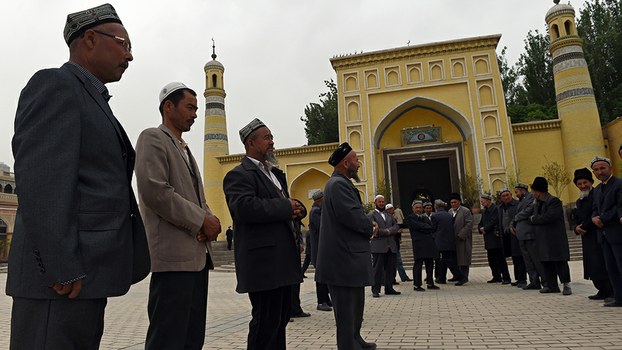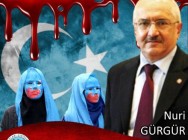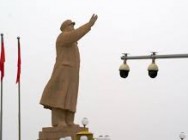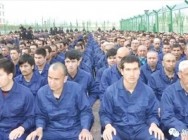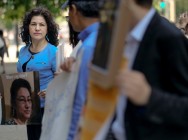Last Minute

- Conflict and Alliance: The US and China: A Centennial Dance: A Century of Relationship from 1900 to 2024
- CHINA RELATIONSEAST TURKESTAN PROBLEM AND TURKEY
- FRONTLINE China Undercover
- Elimination of “Uyghur Counter-Revolutionary Officials” in Academic Fields—Exact Quotes Translated from a Mandarin Audio File
- In Push for Trade Deal, Trump Administration Shelves Sanctions Over China’s Crackdown on Uighurs
- Dalai Lama’s 60th Anniversary Symposium: İlshat Hassan speech in English and Chinese
- Uyghur Detainees from Xinjiang ‘Placed in Nearly Every Prison’ in Shandong Province
- Shahrezad Ghayrat, Unrepresented Women
- Uighur Americans Speak Against China’s Internment Camps. Their Relatives Disappear.
- Rozinisa: The true story of the Uyghur girls in the prison

-

Conflict and Alliance: The US and China: A Centennial Dance: A Century of Relationship from 1900 to 2024
-

CHINA RELATIONSEAST TURKESTAN PROBLEM AND TURKEY
-

FRONTLINE China Undercover
-

Elimination of “Uyghur Counter-Revolutionary Officials” in Academic Fields—Exact Quotes Translated from a Mandarin Audio File
-

In Push for Trade Deal, Trump Administration Shelves Sanctions Over China’s Crackdown on Uighurs
-

Dalai Lama’s 60th Anniversary Symposium: İlshat Hassan speech in English and Chinese
China Holds Ethnic Uyghur Woman For Reposting Quranic Verses on Social Media
Chinese authorities in the troubled northwestern region of Xinjiang have detained a Uyghur woman for retweeting social media posts quoting the Quran and other religious content.
The 26-year-old member of the mostly Muslim Uyghur ethnic group was detained in Korla city on May 7 after forwarding posts that carried devotional Islamic messages, including quoting from Muslim scripture and praising Allah.
She is now being held under criminal detention on suspicion of promoting “extremist religious thought,” sources in the region told RFA.
An employee who answered the phone at the government-backed website Licheng Online Police, which received the initial “tip-off” about the woman’s posts on the popular chat service QQ, confirmed the reports of the woman’s detention.
Asked if the detainee was a young Uyghur woman, he replied: “Yes, that’s correct … We work against forbidden content that promotes separatism, or damages ethnic unity, or that is forbidden.”
“There is also extremist religious content that you’re not allow to repost, and she reposted it; she reposted that kind of thing many times,” he said, adding that quotations from the Quran or about Allah are “against the law.”
He said the severity of the woman’s punishment would depend on which laws she was judged to have broken.
“People who read this sort of extremist content can undergo personality changes over the long term, so if we don’t nip it in the bud, she could become unrecognizable,” he said.
But Dilxat Raxit, spokesman for the Germany-based World Uyghur Congress group representing the Turkic-speaking ethnic group, said the woman could face serious charges, owing to recent government policy targeting every aspect of Uyghurs’ religious lives.
“I fear that this woman may be severely punished for incitement to extreme religious thinking in the current climate that is extremely repressive of [Islam],” Raxit told RFA.
Quran ban
Meanwhile, an internet user based in Xinjiang said the Quran is banned from open sales in bookshops in the region.
“I have experienced something like this as well,” said the internet user, who has previously been accused of “propagating extremist religious content as text and images.”
“It was of people wearing Islamic dress, black from head to foot, and the star and crescent moon symbol of the Muslim faith,” the user said. “When I retweeted it, I got a message back saying that it had been deleted.”
“The Quran is banned from sale in public places, and it’s a very sensitive issue; it’s banned,” he said. “I have been to several bookshops … and asked to buy it, to read by myself, and they said it is currently under review.”
“The government is currently approving a new version of the Quran,” he said.
An employee who answered the phone at the Korla municipal police department hung up the phone when contacted by RFA on Monday.
An official who answered the phone at the municipal branch of China’s powerful Cyberspace Administration confirmed that any content promoting “separatist” views would be deleted.
“The internet police will delete any images it regards as sub-standard, and there are also appropriate punishments,” the official said. “The Quran is regarded as pretty separatist.”
“The other thing is people wearing beards and dressed entirely in black, which has a kind of separatist feel to it,” he said.
Asked if such content is believed by China to be linked to terrorism, the official declined to comment.
“I can’t read out all of our requirements from this document for you; it’s a classified document,” the employee said. “I can’t tell you all of it.”
‘Religious extremism’
China has vowed to crack down on what it calls religious extremism in Xinjiang, and regularly conducts “strike hard” campaigns including police raids on Uyghur households, restrictions on Islamic practices, and curbs on the culture and language of the Uyghur people, including videos and other material.
While China blames Uyghur extremists for terrorist attacks, experts outside China say Beijing has exaggerated the threat from the Uyghurs and that repressive domestic policies are responsible for an upsurge in violence there that has left hundreds dead since 2009.
Last month, officials revealed a region-wide policy to ban dozens of baby names with religious meanings that are widely used by Muslims elsewhere in the world.
Islam, Quran, Mecca, Jihad, Imam, Saddam, Hajj, and Medina are among dozens of baby names banned under ruling Chinese Communist Party’s “Naming Rules For Ethnic Minorities,” they said.
Reported by Xin Lin for RFA’s Mandarin Service. Translated and edited by Luisetta Mudie.
http://www.rfa.org/english/news/china/verses-05092017110330.html
RELATED NEWS






